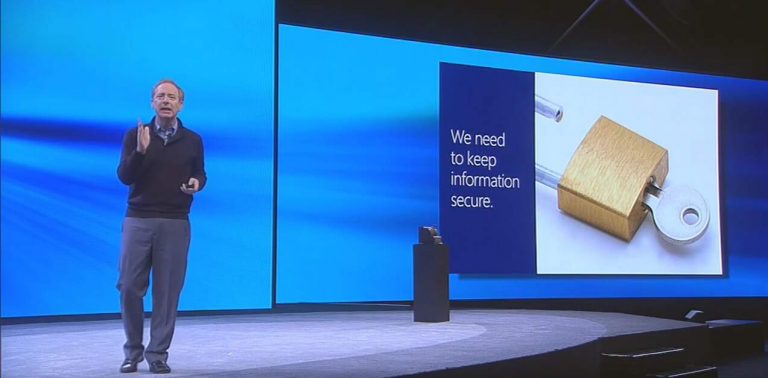Microsoft’s chief legal officer Brad Smith made some declarative statements regarding the company’s position in the growing public realization of security and privacy in a new technological age. Specifically, Smith, on behalf of Microsoft, offered support of Apple’s ongoing battle with the Federal Bureau of Investigation over a request to unlock a particular iPhone associated with terrorist activity.
Until the case is heard, the details regarding the FBI request and Apple’s dissension are questionable at best, but what remains steadfast is Microsoft’s position on the matter. After speaking to the US Judiciary Committee last week, Smith is further clarifying his statements in a keynote address at an RSA conference in San Francisco.
Drumming the same beat he offered during the Conflicts of Law Concerning Border Data Flow and Law Enforcement Request hearing, Smith continues to posit that the FBI’s request for a backdoor or sorts into the iPhone in question is a road that will not end well for anyone.
Despite the best intentions, one thing is clear: the path to hell starts at the back door, and we need to make sure that encryption technology remains strong,”
While most tech headlines have recently donned the Apple fight as its martyred cause, Geekwire reports that Smith reminds RSA attendees that as important as encryption is, it’s the eroding trust in the US government to be its own watchdog that has help lead to the current sad state of affairs.
Trust has been under threat. Trust has been questioned for good reason,” he said, pointing to the Edward Snowden revelations as a sign that both the U.S. government and companies had enabled privacy breaches of citizens. “All of this is leading to a fundamental question: What’s to be done?”
Smith also reminds people that as much as it seems the tech community is playing on the inherent distrust of its government to manage a buffer between invading personal privacy and legitimate investigative searches, Microsoft has and will continue to aid the government when possible. Using last year’s terrorist attacks in Paris as a backdrop, Smith explained that Microsoft received 14 requests from the government about suspects still yet to be apprehended. After verifying the legality of the request, Microsoft was able to provide the vital information in under 30 minutes per request. Admittedly a fine line to walk, Microsoft agrees that helping the government while standing up for its customers can be accomplished.
We do play our role as an industry, but we also need to stand up for customers.”
More to the point, Smith, like many others, believes there should be checks and balances in place for government requests that put tech companies far removed from instances like the one Apple is in currently.
In the end, most supporters in favor of Apple in its current battle with the FBI echo the same sentiment: using a single hammer to nail multiple situations with individual nuances isn’t the answer. More important, Microsoft, along with others, are urging the discussion of technology and privacy be held at a time of relative civil rest and ease, rather than at the height of emotional fervor that has already arguably led to the trampling of individual privacies we’re experience now.


